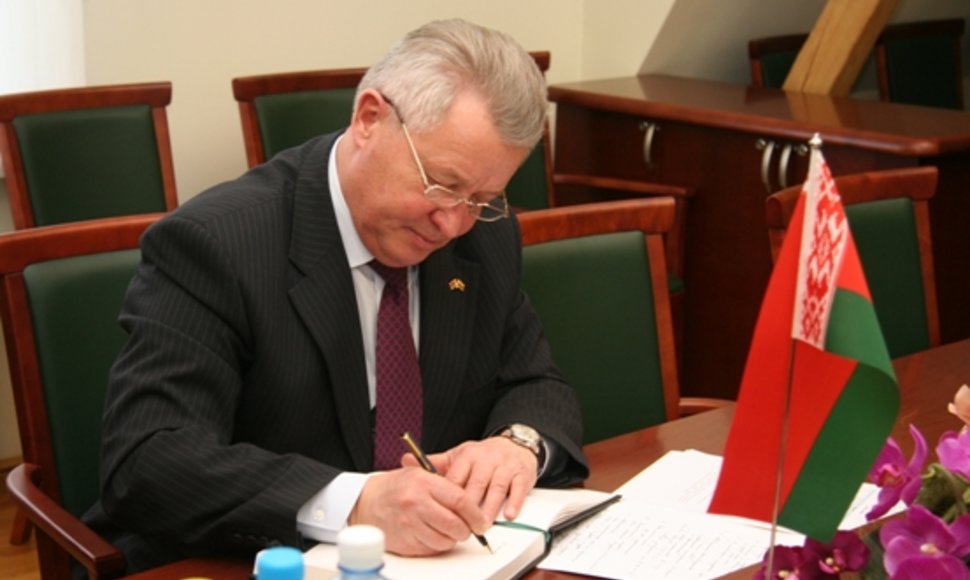"The Ministry of Foreign Affairs would like to note that the Belorussian ambassador's statements are biased and fail to reflect the actual situation, while comments about Lithuanian politicians should be viewed as incorrect and unbecoming for a diplomat," the ministry's representative Mindaugas Lašas told BNS on Thursday.
In his words, the future of Belorussian relations with the EU depends on Mink's behavior.
"The ambassador is well aware that the key to normal EU-Belorussian relations lies in his country, and it is the actions of Minsk that will determine the future of EU-Belorussian ties," Lašas added.
The diplomat also said that EU had not launched any sanctions against Belarus' economy sectors, while the target restricting instruments were currently applied upon individuals and legal entities that have contributed to the worsening situation of human rights and freedoms in Belarus.
In an interview to a Kremlin-linked Russian news agency Regnum, Drazhin warned that Lithuania's support to EU sanctions against Belarus could jeopardize the Belorussian transit via its Klaipėda seaport, which would lead to billions of litas in losses.
"I believe Lithuania understand the consequences of the sanctions for its economy. Here is the data provided by Belorussian and Lithuanian economists. If we terminate the cargo transit via Klaipėda today, Lithuania will lose 7 billion litas (EUR 2.03 b). Should the EU choose the path of giving up Belorussian commodities on foreign markets, (…) Belarus will be forced to take adequate measures," Drazhin said.
"Capacities of the port will become stalling. About 4,500 employees of the Klaipėda port and related companies will be redundant. Railways will have to give up approximately 3,500 employees. According to preliminary data, the jobless army will swell by 12,000 people. This is a problem of national scale. This is the price of the issue, and Lithuanian politicians should think about the price," the ambassador said.
"I would also like to emphasize: if politicians stay out, trade and economic relations between Belarus and Lithuania will improve, and Klaipėda will become the main seaport for Belarus. We're satisfied with everything about Lithuania," said the Belarusian diplomat.
He noted that the majority of Lithuanian companies disapprove of economic sanctions against Belarus.
"We see a major contrast between political and business attitudes. One can only wonder: politicians either do not understand what's happening or understand it but continue doing what's illogical and damaging for the state. However, if Lithuania's conduct is correct, it will avoid the Latvian scenario," the news agency cited Drazhin as saying.
He noted that the EU would reimburse Lithuania's losses it will incur in the wake of losing Belorussian cargo.
"In Lithuania, they like to say: 'we and the EU', 'we support the joint EU position.' Please note: if the EU compensates for the economic damages, why not be together with it. However, the EU will hardly do this now in the current economic and financial downturn amid the proposals to cut Brussels support to Lithuania by 14 percent," Drazhin said.
He also noted that Minsk had doubts about the facilitated border travels with Lithuania amid the EU sanctions against the regime of Belarus' hard-line President Alexander Lukashenko.
"The Lithuanian side has prepared all the necessary documents. It says it's ready. And here it immediately applies sanctions. When Lithuanian politicians make loud statements about expulsion of Belarusian ambassadors, what border travels are we talking about? I believe we should first learn to maintain a dialogue," said the ambassador.
At the same time, he noted that an analogous agreement was in effect with Latvia in Daugavpils region, as Latvia was "treating Belarus in a somewhat different way."
"That's why progress can be observed there. The impression is that the Lithuanian side is working in the direction, but does not want a result. Also, its activities lack sincerity. Therefore, if I were in the shoes of my colleagues at the Lithuanian Foreign Ministry, I would not shift the problem to Belarus," the diplomat said.
In the end of February, Lithuania's Foreign Minister Audronius Ažubalis said that Lithuania had officially handed a note to Belarus to notify it of Lithuania's readiness for a facilitated border-crossing scheme. For the system to take effect, a relevant step on the Belarusian side is needed.
The EU is stepping up sanctions against Belarus in protest of persecution of political opponents and human rights restrictions.
Last month, EU foreign ministers decided to impose sanctions against 29 Belorussian companies owned by three businessmen close to Lukashenko, and another 12 people were blacklisted.
The EU sanctions were for the first time imposed against companies owned by oligarchs Yuri Chizh and Anatoly Ternavski. New enterprises owned by businessman Vladimir Peftiyev were also blacklisted. These companies, called Lukashenko's "purses", will be able to make financial transactions in the EU.
After Lithuanian business representatives warned about the damages of the economic sanctions for Lithuania, diplomats dismissed the fears as ungrounded, as no “large-scale economic sanctions” had been taken against Belarus, with measures imposed against oligarchs, not state companies.












